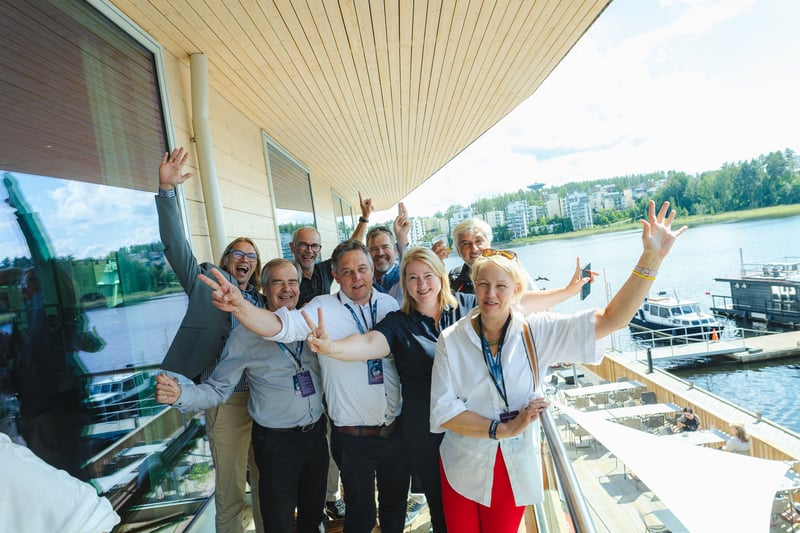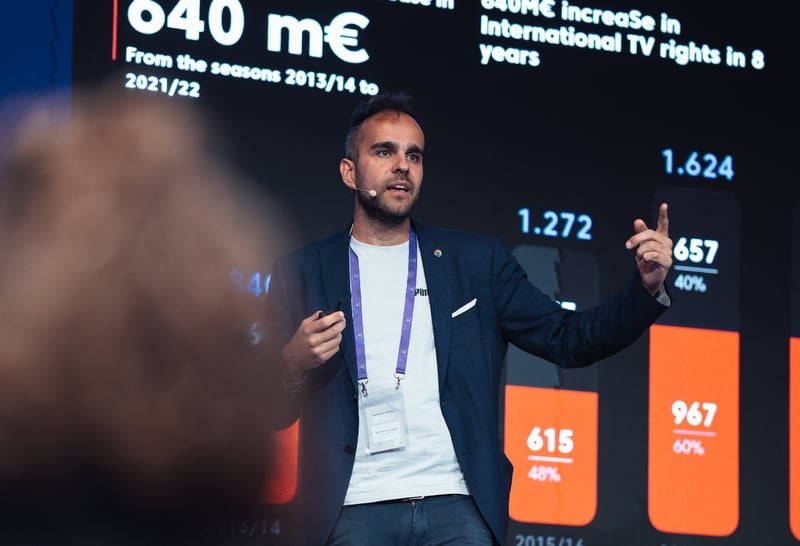Emotions affect people’s behavior, performance, and decisions in the workplace, and ultimately the company’s performance. Among the most important skills of a leader are learning to stop and be present for both themselves and the work community, as the energy and emotional intelligence of a leader who feels well and is self-aware are reflected throughout the work community. “Showing appreciation, for example, costs nothing, but it has a huge influence on what people achieve,” says Mari Ravattinen, the coach in the Leader360 program.
In May HHub’s Leader360 program focused on emotions and creativity as a means of recovery. The leader of the day, Mari Ravattinen, who previously worked as an occupational physiotherapist, had a lot to do with various body-related pains and musculoskeletal disorders at the beginning of her career.
– In occupational health care, I noticed that in many cases, stress, sleep problems and pent-up feelings were behind these symptoms. When they talked about pain, people started talking about their lives. With this insight, I set out to study and learn more about how a person can start to affect their own mind and emotions, she says.
Learn to stop
Ravattinen’s and Lauri Tähkä’s company Mielen Melodiat supports the development of the wellbeing of both individuals and work communities through various methods. When Ravattinen asks customers about their values, health and family often come out on top. Despite this, many people do not have the time or willingness to focus on their own health.
– Stopping and calming down is often difficult for modern people and it requires training, Ravattinen says.
The more intensely and efficiently we work during the day, the harder it is to break away from work after the workday.
– Even if you turn off the laptop and phone notifications, work will still revolve in your mind and the brain can’t enter a state of psychological recovery. The brain is, figuratively speaking, exhausted all the time, Ravattinen describes the problem.
Although emotions, creativity and recovery are usually connected with the mind, Ravattinen points out that it is a question of the person as a whole being.
– Our bodies are really wise and often try to tell us things, but today’s people do not know how to listen to these messages. Body awareness, presence, and mindfulness are ways to become more aware of and balance your state of over- or under-arousal.
– My goal is to help people understand how their minds and thinking can really place wellbeing at the strategic center of their lives.
Be present to yourself and the work community
Ravattinen emphasizes that everything starts from one’s own consciousness. How aware you are of your own body, thinking and feelings.
– This means how present you are to yourself and others right now. How aware you are of the moment. What is your state of alertness or your energy level, she says.
Ultimately, stopping and being present in the moment should become one of the factors that guide life.
– For many managers, it is a big realization that inserting breaks in work, taking a half-hour walk, and regularly giving space for stopping, creativity, and meeting people can accomplish more than always reflecting time usage against efficiency and productivity,” she says.

– For managers and entrepreneurs, taking care of their own energy and being able to stop are especially important because in an organization, emotions are contagious: the leader’s energy, emotional intelligence, and ability to inspire others are reflected in the work community.
The importance of emotional intelligence in business has been studied a lot in recent years.
– A manager with emotional intelligence can achieve better results in an organization in many ways, both in terms of performance and the wellbeing of the work community.
It is important for a leader to learn how to identify people’s emotional states and understand how much emotional intelligence affects, for example, sales and the entire business.
A stressed person cannot be creative
A person focused on performance and working at maximum capability may no longer be aware of their fatigue. In a state of stress, the lizard brain takes over, thinking becomes narrower and the person may behave very reactively – get nervous or even scream.
– A person simply cannot be very creative in a stressed state, Ravattinen says.
– From a leader’s perspective, this is important. Any work community where people’s brains and bodies are under constant stress cannot achieve new, optimal results or arrive at the best insights. That’s why training the mind and understanding your emotions are so important, she emphasizes.
Most leaders face mentally demanding periods in their work. Challenging changes in the business environment, work community, or personal life can lead to a situation where fear attempts to take over.
– The leader must have resilience, emotional intelligence, the ability to think solution-oriented and to manage their feelings. When you take care of yourself, you can also take care of your work community.
The most important feeling in the work community is appreciation
Ravattinen often conducts emotional atmosphere measurements for her customers. Regardless of the nature of the organization, the most important feeling is almost always appreciation.
– If a person does not feel appreciation in everyday life or work, it begins to affect their wellbeing. But if they feel they are appreciated by someone important to them, most people are willing to put in a small extra effort for that person if such a situation arises.
Emotions are brain chemistry and hormones, Ravattinen points out.
– Experiencing appreciation produces dopamine and serotonin in the brain, which in turn affects a person’s functions and productivity. Appreciation costs nothing, but it has huge power.
People are also individuals: one needs praise every day, the other needs more subtle feedback.
– But I have yet to encounter a person who would not be empowered by appreciation, Ravattinen says.
– So, let’s praise more, encourage more, celebrate successes. Praising others can be practiced and when it’s embedded into the everyday working life of your team, it will become an important resource for the whole community.
In the end, the recipe is quite simple:
– When your mind feels well, creativity, appreciation and relevance of your work create themselves.



